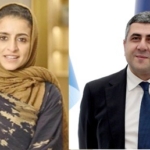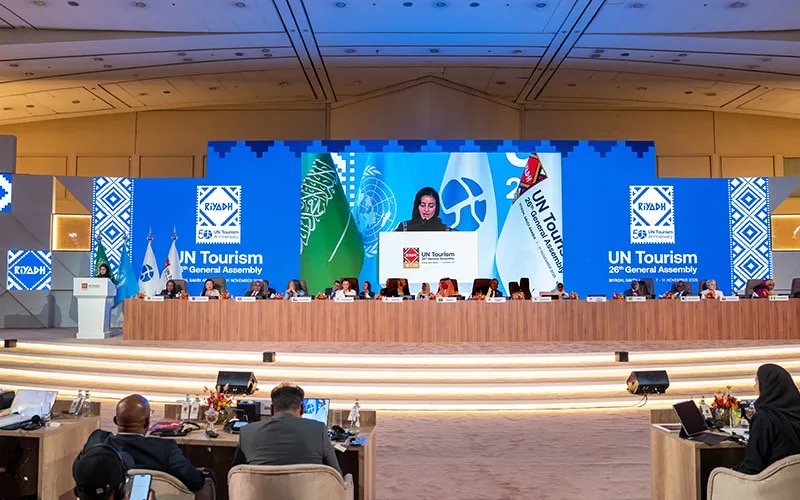
In Riyadh, a city emblematic of transformation and ambition, the 26th UN Tourism General Assembly opened with a tone of reflection and renewal as Zurab Pololikashvili delivered his final address as Secretary-General and Shaikha Nasser Al Nowais of the United Arab Emirates accepted her nomination as his successor.
The gathering, hosted by the Kingdom of Saudi Arabia, drew ministers, ambassadors, and delegates from over 160 Member States for what has become one of the most defining moments in UN Tourism’s 50-year history.
Zurab’s Swan Song: A Call for Unity, Optimism and Innovation
In his final opening remarks as Secretary-General, Zurab Pololikashvili thanked Member States for their trust and cooperation during his two terms in office, reflecting on the organisation’s growth, resilience, and transformation under his leadership.
“It is a true honour to be addressing this esteemed Assembly as Secretary-General for one final time,” he said. “Some of you have been with me from the very start of my first mandate. Others have joined more recently. In all cases, I thank you for your support and your commitment to shaping our Organisation’s future.”
He paid glowing tribute to Saudi Arabia’s tourism transformation, describing it as “an incredible journey” that began six years ago when the country launched its e-visa system. “Today, tourism is a key sector of the Saudi economy,” he noted. “It is a driver of Vision 2030, a top employer, and an example for other countries to follow.”
Pololikashvili commended His Excellency Ahmed Al Khateeb, Minister of Tourism of Saudi Arabia, for his leadership, calling him “a visionary and a true ally and friend” of the Organisation. “Like any good friend, he has supported us but also at times challenged us,” he added, thanking him for his “commitment to unleashing the full power of our sector as a force for good.”
The outgoing Secretary-General also spoke candidly about the global challenges confronting the tourism industry — climate change, inequality, insecurity, and a breakdown in international trust — while urging delegates to approach these issues with determination and optimism.
“What makes this Organisation so special,” he said, “is that we find opportunity in adversity. And we always look to the future.”
Pololikashvili highlighted innovation and education as enduring priorities for UN Tourism. He pointed to the Regional Office for the Middle East, based in Riyadh, as a “true hub for supporting new talent and growing new ideas”, and thanked Saudi Arabia for its leadership in advancing tourism education worldwide.
“Our Organisation has never been stronger,” he concluded. “I look forward to a productive session where all voices are heard and respected, and a spirit of cooperation shines through.”
Shaikha Al Nowais: A New Chapter for Global Tourism
Following the ratification of her nomination by the Executive Council, Shaikha Nasser Al Nowais delivered her acceptance speech, heralding a new chapter for UN Tourism and making history as the first woman to lead the Organisation since its establishment in 1975.
“It is a profound honour to be with you here in Riyadh — a city that reflects transformation, ambition, and vision,” she began. “This is not the victory of one; it is a triumph for all of us — a shared moment that reflects our collective vision for a stronger, more connected, and more compassionate world of tourism.”
In her speech, Shaikha Al Nowais expressed heartfelt gratitude to Saudi Arabia for hosting the milestone Assembly and to Minister Al Khateeb and the Ministry’s senior leadership for their “gracious support, leadership, and passion for advancing the tourism sector.” She praised the Kingdom’s transformation as “a milestone for the entire GCC region and the Middle East” and “a testament to how tourism has become a bridge between cultures and a driver of opportunity and peace.”
She also extended appreciation to the 160 Member States that supported her candidacy. “Your confidence is both humbling and inspiring,” she said. “Together, we represent the hopes of millions whose lives are touched by this sector.”
Tourism with Purpose
In outlining her vision, Shaikha Al Nowais called for a new era of purpose-driven leadership within global tourism — one that goes beyond growth metrics to measurable human impact.
“We must look beyond numbers to deeper impact, beyond growth alone to growth with purpose, and beyond commitments to sustainability to collective action that endures,” she said.
She identified five shared priorities that will guide her administration:
1. Responsible tourism – ensuring growth that respects people and the planet.
2. Capacity building – empowering communities, women, and youth.
3. Technology for good – harnessing innovation for inclusivity and resilience.
4. Innovative financing – expanding access to resources for sustainable projects.
5. Smart governance – promoting accountability and collaboration at all levels.
Her speech was both visionary and deeply human. “Tourism connects not just destinations — but dreams,” she said. “It creates jobs, preserves heritage, empowers women and youth, and brings hope where it’s needed most.”
She closed with a call to unity: “Let us remember this day not as the close of a campaign, but as the beginning of a new chapter — one defined by collaboration, courage, and compassion. Let us build a tourism sector that serves humanity, protects our planet, and celebrates the beauty of every culture and every traveller’s story.”
Legacy and Renewal
As the 26th UN Tourism General Assembly continues in Riyadh, the event has become both a celebration of Zurab Pololikashvili’s legacy and a launchpad for Shaikha Al Nowais’s vision.
For the global tourism sector, it marks a symbolic handover from a period defined by recovery and reform to one shaped by inclusion, innovation, and shared responsibility.
If the tone of Riyadh’s opening day is any indication, UN Tourism’s next chapter will be one that balances continuity with renewal — honouring the past while setting a bold new course for the future of global tourism.
